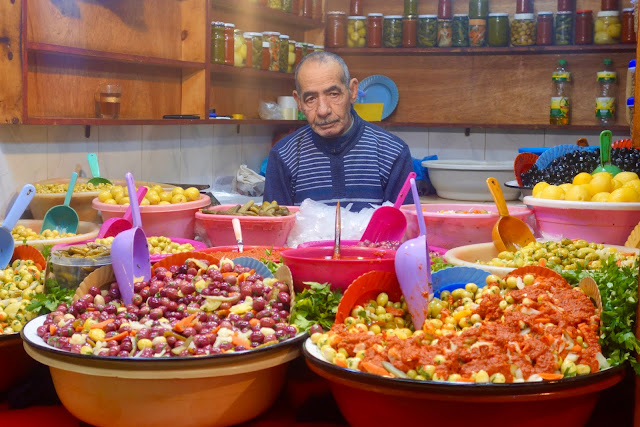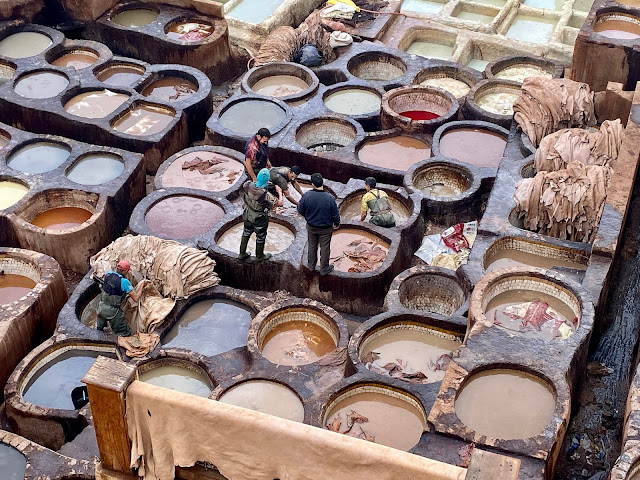First stop in Fes, Morocco's second largest city: the Royal Palace, which is decorated with what may very well be soccer balls (look closely between the circular mosaics). Apparently World Cup fever (c.a. 1970, when new front gates were reoriented) trumps the Islamic prohibition against using all but floral or geometric design.
Khalid, happy to answer Thom's question about the anomalous motif, was just as willing to engage in any discussion that promoted his country's moderate form of Islam. A Moroccan husband, for example, can take a second wife only if he has permission from the first. Women's empowerment, fer sure!
We passed shops selling wedding goods and food en route to the neighborhood where Jews had worked and lived for centuries under the protection of the king. Today, only five remain in the entire city! According to Khalid, Israel paid Morocco $10 a head to have 100,000 resettled, many kicking and screaming, during a forced expulsion in the early 70s. Nation building is never pretty, even in the promised land.
You can tell these apartments were built for Jews because their balconies face the street. Muslim balconies face inward. Sounds like a metaphor to me.
Storks took morning roost on a nearby security tower.
It seemed as if the streets of Fes were once paved with mosaic.
Nearly 10,000 narrow, loosely covered alleys comprise the medina, where people have lived, worked and shopped for more than a thousand years.
Nothing in the city's old section is taller than the minaret looming above the central mosque.
We spent much of the morning at the Mosaic and Pottery Cooperative.
Many of these young men learned the exacting trade from their fathers. But the manager of the cooperative said fewer were interested in continuing the tradition.
I got a head start on my holiday photos with these menorahs.
If Egypt is like visiting the ancient world, frozen in time, entering the medina is stepping into the still lively Middle Ages. It blew my mind.
Look closely and you'll occasionally see a street sign. Getting lost is definitely part of the experience.
Shopping for food excites all your senses. I said shopping, not selling!
Camel head soup?
Here's how to heat a freshly rolled bread snack.
Contrary to American perceptions shaped by 9/11, a Moroccan madrasa, where children learn the Koran, can offer an oasis of calm and contemplation, rather than a hotbed of Islamic fundamentalism.
Just because there aren't any cars in the medina doesn't mean there's no traffic on the cobblestones.
Neighborhoods are characterized by particular trades, including copper smithing.
Dogs don't seem to mind the hubbub.
Chouara tannery has been in continuous operation since the 11th century. Put that in your pipe and smoke it, America. The man at the entrance hands you a sprig of mint to hold to your nose.
You're led past room after room of colorful shopping opportunities to prime you for the incredible view that awaits from an interior balcony.
Keep in mind you've been negotiating tight alleys and dodging donkeys and carts for an hour or so.
How many leather workers suffered chemical burns and respiratory distress to give Arko a new place to nap?
This blasé kitty, lounging on sheepskin, couldn't have cared less.
Afterward, we broke for a local specialty, chicken pastilla.
Modeling scarves requires energy.
Just ask Jean!
The medina introduced Thom to the concept of tanning while you work.
This weaver demanded a tip, too!
Occasional traces of the modern world can be glimpsed within the medina's walls.
Speaking of the modern world, on our way back to the hotel we stopped by Carrefour--the modern antithesis of the medina--to prepare for what our guide called "an alcohol cave" the next day. You can bet these mall rats hadn't been toiling over mosaics all day. Their female equivalents had been inside taking selfies with the Christmas decorations!
Thom and I took a taxi back to the medina later in the afternoon.
Neither of us ever had been to a hammam for a steam, a scrub and a massage. That's the wrong order, by the way. The massage usually comes last but our masseuses (!) were booked later.
Too bad Mernissi catered mostly to tourists. I would have preferred something more authentic, although the my body's dead skin couldn't tell the difference.


























































No comments:
Post a Comment